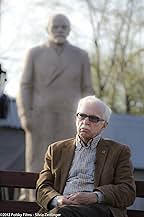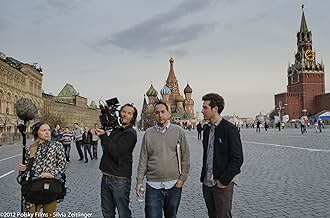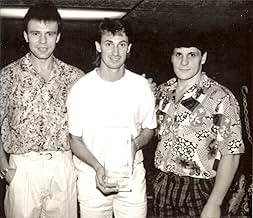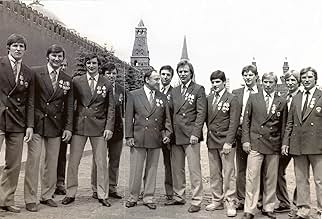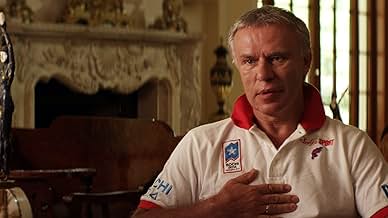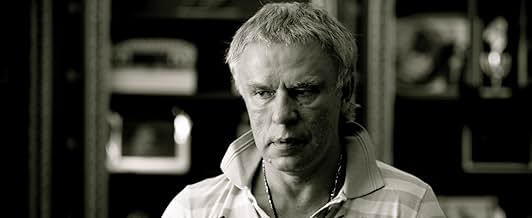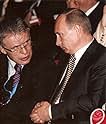Red Army
- 2014
- Tous publics
- 1h 24min
NOTE IMDb
7,6/10
7,3 k
MA NOTE
Ajouter une intrigue dans votre langueThe story of the Soviet Union's famed Red Army hockey team through the eyes of its players.The story of the Soviet Union's famed Red Army hockey team through the eyes of its players.The story of the Soviet Union's famed Red Army hockey team through the eyes of its players.
- Réalisation
- Scénario
- Casting principal
- Récompenses
- 5 victoires et 11 nominations au total
Viacheslav Fetisov
- Self
- (as Slava Fetisov)
Herb Brooks
- Self - US Olympic Coach
- (images d'archives)
- (voix)
Don Cherry
- Self - Hockey Commentator
- (images d'archives)
- (voix)
Avis à la une
There has never been such beauty in sport than ice hockey performed by the Soviet Union at its best. How was it possible? It's pretty obvious that it all was due to propaganda reasons. The Communist human was superior, according to Soviet leaders. Or at least they wanted to think so; but the almost only way to prove it was through the athletes.
The legendary Fetisov tells most of the story here. How the players were kept almost as slaves under the regime of KGB man Tichonov. And when finally the Soviet system broke down, Fetisov and his comrades were allowed to play in NHL. But had to give most of their money to the embassy.
A sometimes breathtaking documentary and the system succeeded in creating some of the best athletes ever. And yes, they impressed the West. But the price was high.
The legendary Fetisov tells most of the story here. How the players were kept almost as slaves under the regime of KGB man Tichonov. And when finally the Soviet system broke down, Fetisov and his comrades were allowed to play in NHL. But had to give most of their money to the embassy.
A sometimes breathtaking documentary and the system succeeded in creating some of the best athletes ever. And yes, they impressed the West. But the price was high.
I came away from this movie deep in thought, trying to piece together the personal journeys of the cast, the context of life in the USSR, the changes and resulting impact upon the players lives.
This documentary is well researched and highly viewable, it is not just a male only film.
Women get to see stripped to the bare bone, deep male team bonding, open responses to complex relationships and real meaning as to how 5 men dominated a sport in the USSR and the Americas.
The death of one of the cast members shortly after the movie added a melancholy touches, yet there is humour from both Gabe Polsky and Vyacheslav Fetisov.
It was clever, I see this documentary staying around for some time, certainly one to watch again.
This documentary is well researched and highly viewable, it is not just a male only film.
Women get to see stripped to the bare bone, deep male team bonding, open responses to complex relationships and real meaning as to how 5 men dominated a sport in the USSR and the Americas.
The death of one of the cast members shortly after the movie added a melancholy touches, yet there is humour from both Gabe Polsky and Vyacheslav Fetisov.
It was clever, I see this documentary staying around for some time, certainly one to watch again.
"Ninety percent of hockey is mental and the other half is physical." Wayne Gretsky
In Gabe Polosky's expert documentary, Red Army, the understanding of modern Russian hockey history filters through the influence of legendary coach Anatoly Tarasov. He taught young and old about how to play hockey like chess layered over with the best of communist collectivist philosophy—a blueprint for world-class teamwork dominance from 1954-91.
The star of this doc is Vyacheslav Fetisov ("Slava"), whose play, along with four other Russian teammates, dominated world hockey for years. His face full of character in middle age, his understanding of human nature, and his devotion to the best of what Russia could offer make for no-bathroom-break-allowed drama. His defection that results in losing his best friend, Kasatonov, is the stuff of real-life drama. Yes, there are arresting shots of hockey that seem more like perfect video games than the real-live action they are, but it's the humanity that make this film outstanding.
Slava is central-casting smart and handsome carrying an abiding love of the motherland conflicting with a heightened sense of things going wrong after the Cold-War halcyon days. To hear him extol the spirit of collective achievement is to put in relief our emphasis on individuality, for its strengths and weaknesses. Polosky does not belabor the good and bad of the competing systems but rather presents the victories and defeats as a matter of history and politics: "Draw your own conclusions," he might say.
That classic documentary "lack of bias" sometimes is frustrating. For instance, I would like to know how much of either ideology—American vs. Russian—plays in the "miracle" of the USA win at the 1980 Olympics in Lake Placid. Did the invulnerable Russian five suffer from their dislike of new coach Tikhonov's dictatorial ways (e.g., he wouldn't let a player leave to see his dying father!)? I need to go back, I guess, to another great doc, Miracle (2004), to see Kurt Russell play the legendary Herb Brooks and his victorious USA Olympic team. I suspect the reason for the Russian failure will be less apparent than the American victory.
I am nitpicking here because overall the film is exemplary historical reporting without forcing inferences about facile conjunction. Even if you're not a hockey fan, you'll delight learning about truly great players who came to America, eventually living the dream but not without a rocky adjustment as they learned to love individualism in a new country that didn't accept them as graciously as I would have expected.
See Red Army and be uncomfortably embarrassed. They were good guys.
In Gabe Polosky's expert documentary, Red Army, the understanding of modern Russian hockey history filters through the influence of legendary coach Anatoly Tarasov. He taught young and old about how to play hockey like chess layered over with the best of communist collectivist philosophy—a blueprint for world-class teamwork dominance from 1954-91.
The star of this doc is Vyacheslav Fetisov ("Slava"), whose play, along with four other Russian teammates, dominated world hockey for years. His face full of character in middle age, his understanding of human nature, and his devotion to the best of what Russia could offer make for no-bathroom-break-allowed drama. His defection that results in losing his best friend, Kasatonov, is the stuff of real-life drama. Yes, there are arresting shots of hockey that seem more like perfect video games than the real-live action they are, but it's the humanity that make this film outstanding.
Slava is central-casting smart and handsome carrying an abiding love of the motherland conflicting with a heightened sense of things going wrong after the Cold-War halcyon days. To hear him extol the spirit of collective achievement is to put in relief our emphasis on individuality, for its strengths and weaknesses. Polosky does not belabor the good and bad of the competing systems but rather presents the victories and defeats as a matter of history and politics: "Draw your own conclusions," he might say.
That classic documentary "lack of bias" sometimes is frustrating. For instance, I would like to know how much of either ideology—American vs. Russian—plays in the "miracle" of the USA win at the 1980 Olympics in Lake Placid. Did the invulnerable Russian five suffer from their dislike of new coach Tikhonov's dictatorial ways (e.g., he wouldn't let a player leave to see his dying father!)? I need to go back, I guess, to another great doc, Miracle (2004), to see Kurt Russell play the legendary Herb Brooks and his victorious USA Olympic team. I suspect the reason for the Russian failure will be less apparent than the American victory.
I am nitpicking here because overall the film is exemplary historical reporting without forcing inferences about facile conjunction. Even if you're not a hockey fan, you'll delight learning about truly great players who came to America, eventually living the dream but not without a rocky adjustment as they learned to love individualism in a new country that didn't accept them as graciously as I would have expected.
See Red Army and be uncomfortably embarrassed. They were good guys.
"Do you believe in miracles?! YES!!" That was sportscaster Al Michaels' immortal exaltation at the end of the 1980 Olympic hockey game which became known as "The Miracle on Ice". An American team of amateur and college hockey players had defeated the vaunted team from the Soviet Union, which had won the gold medal in the last four Winter Olympics and six of the last seven. The U.S. team would go on to win the gold medal by defeating Finland. The highly improbable American victory over the Russians was named by Sports Illustrated as the greatest sports moment of the 20th century and spawned a TV movie, a documentary film and the 2004 feature "Miracle" starring Kurt Russell. But what of the Soviet team? How did this shocking loss affect them? And was this the beginning of the end for Russian dominance of international ice hockey? The documentary "Red Army" (PG, 1:25) answers those questions and many more as it delves into the stories of the men behind the hockey masks and the dramatic history of their national sport.
The story of the Soviet Red Army hockey program is one of athletic, social, political and military influences that reflected the larger phenomenon of the Cold War and dictated the fates of those involved. This film contains the kind of interviews that you'd expect from such a documentary and also uses little-seen archival footage, creative modern graphics and skilled editing to tell this story in a very engaging way. The main interviewee is Soviet team captain Viacheslav Fetisov who describes his story as it felt back then and apparently still feels today. Interviews with his wife, his former teammates, a former KGB agent and a few journalists tell of their experiences and give valuable color commentary, but just as revealing is what is NOT said in the documentary. Co-producer, director, writer and interviewer Gabe Polsky is smart enough to turn the camera on early, keep it rolling and edit into the film the honesty and emotion that shows itself in the candid moments and unguarded reactions of his interviewees.
The film's scope covers over four decades of the Soviet Union's hockey program, but focuses mainly on the 1980s, a decade which began with Cold War tensions heightened by the Soviet invasion of Afghanistan and ended with the rapid decline of the USSR as a unified state. During this period, Fetisov and his teammates absorbed that crushing Olympic defeat, dealt with the changes that followed, rose to new challenges and, eventually, began to consider careers in the NHL, as the Soviet government gradually loosened its strong grip on its players, just as it began losing control of its people and its empire. Polsky uses all the tools at his disposal to illustrate how the Russians ran their program and what that program meant to the country. We see children from all over their massive and diverse nation training, playing and competing within the program. We observe "the best of the best of the best", as one interviewee describes them, transition from hockey players to Russian icons, and cogs in the Soviet Union's propaganda machine. We learn that these elite players were to place hockey above literally everything else in their lives. We come to understand that their purpose was to embody the superiority of their communist system. We get to peek behind the Iron Curtain and contemplate an untold story unlike any other in sports.
"Red Army" doesn't just reveal the untold story of the Soviet Union's ice hockey program, but helps us see that the men involved were more than their government's propaganda puppets, but were human beings with desires for their lives, both common and uncommon problems, and impressive amounts of talent and work ethic. This is a documentary that feels like a drama. The film brings openness to a notoriously closed system and tells a story that most audience members have never thought about, but will be unable to avoid thinking about after seeing this movie. The only weak spot I noticed was the soundbites of the director's amateurish interviewing techniques. That aside, this is a fascinating film which raises the bar for future documentaries of its kind. "A-"
The story of the Soviet Red Army hockey program is one of athletic, social, political and military influences that reflected the larger phenomenon of the Cold War and dictated the fates of those involved. This film contains the kind of interviews that you'd expect from such a documentary and also uses little-seen archival footage, creative modern graphics and skilled editing to tell this story in a very engaging way. The main interviewee is Soviet team captain Viacheslav Fetisov who describes his story as it felt back then and apparently still feels today. Interviews with his wife, his former teammates, a former KGB agent and a few journalists tell of their experiences and give valuable color commentary, but just as revealing is what is NOT said in the documentary. Co-producer, director, writer and interviewer Gabe Polsky is smart enough to turn the camera on early, keep it rolling and edit into the film the honesty and emotion that shows itself in the candid moments and unguarded reactions of his interviewees.
The film's scope covers over four decades of the Soviet Union's hockey program, but focuses mainly on the 1980s, a decade which began with Cold War tensions heightened by the Soviet invasion of Afghanistan and ended with the rapid decline of the USSR as a unified state. During this period, Fetisov and his teammates absorbed that crushing Olympic defeat, dealt with the changes that followed, rose to new challenges and, eventually, began to consider careers in the NHL, as the Soviet government gradually loosened its strong grip on its players, just as it began losing control of its people and its empire. Polsky uses all the tools at his disposal to illustrate how the Russians ran their program and what that program meant to the country. We see children from all over their massive and diverse nation training, playing and competing within the program. We observe "the best of the best of the best", as one interviewee describes them, transition from hockey players to Russian icons, and cogs in the Soviet Union's propaganda machine. We learn that these elite players were to place hockey above literally everything else in their lives. We come to understand that their purpose was to embody the superiority of their communist system. We get to peek behind the Iron Curtain and contemplate an untold story unlike any other in sports.
"Red Army" doesn't just reveal the untold story of the Soviet Union's ice hockey program, but helps us see that the men involved were more than their government's propaganda puppets, but were human beings with desires for their lives, both common and uncommon problems, and impressive amounts of talent and work ethic. This is a documentary that feels like a drama. The film brings openness to a notoriously closed system and tells a story that most audience members have never thought about, but will be unable to avoid thinking about after seeing this movie. The only weak spot I noticed was the soundbites of the director's amateurish interviewing techniques. That aside, this is a fascinating film which raises the bar for future documentaries of its kind. "A-"
You'll note that the only bad reviews so far are Canadian hockey fans upset that those too young to remember Russian Hockey dominance, will learn that Canada was never the defacto all Hockey rulers of the world as they like to claim. Fact is, Russia was the best in the world for quite some time. This is just a tough pill for Canadian hockey fans to swallow.
My only complaint is the interviewer did come off as amateurish and disrespectful. Outside of that, I thought the film was very introspective with lots of old footage of the former USSR. Excellent interviews. And to the guy complaining about no Tikhonov interview, it clearly stated at the end of the film that Tikhonov declined an interview request.
This is an excellent documentary. If you can put your patriotic homerism aside and respect it for what it is, you will enjoy it.
My only complaint is the interviewer did come off as amateurish and disrespectful. Outside of that, I thought the film was very introspective with lots of old footage of the former USSR. Excellent interviews. And to the guy complaining about no Tikhonov interview, it clearly stated at the end of the film that Tikhonov declined an interview request.
This is an excellent documentary. If you can put your patriotic homerism aside and respect it for what it is, you will enjoy it.
Le saviez-vous
- Citations
(voice): [confused] Wait a second. Go Back. I don't get why Yazov let you leave the country, if he was mad at you.
Viacheslav Fetisov: I'm not a historian. My feeling was the country tried to change something, because it's Perestroika time, but he doesn't want changes. Everybody was afraid. It's understandable. It's like in a dark room, trying to find a dark cat. It's not funny.
[still confused]
(voice): Okay.
- ConnexionsFeatured in Docventures: Urheilu (2015)
Meilleurs choix
Connectez-vous pour évaluer et suivre la liste de favoris afin de recevoir des recommandations personnalisées
- How long is Red Army?Alimenté par Alexa
Détails
Box-office
- Montant brut aux États-Unis et au Canada
- 694 600 $US
- Week-end de sortie aux États-Unis et au Canada
- 20 100 $US
- 25 janv. 2015
- Montant brut mondial
- 798 680 $US
- Durée1 heure 24 minutes
- Couleur
- Rapport de forme
- 1.85 : 1
Contribuer à cette page
Suggérer une modification ou ajouter du contenu manquant








